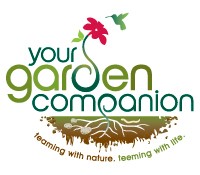Sustainability. It’s not a just buzz word!
At Your Garden Companion, we’re on a mission to help you better understand your property within a larger landscape. Beyond the beauty of a landscape, we can help your family grow your own vegetables and fruits suited to this region, and accent your current landscape with edible native plants and herbs.
We can help you document your blooming times and plant habitat for pollinators and beneficial insects. We can design a rain garden that collects precipitation and funnels it toward your plants.
As we restore the biological health in the soil, increase native plant diversity and restore components of habitat, the food chain builds and the area becomes rich with life. This natural diversity provides resilience in the landscape to resist pests, disease and drought, while servicing your vegetables and fruits with pollinators and releasing natural fertilizers into the soil.
As professional consultants, we help you test and understand the properties of your soil so you have baseline data for making sound choices. We customize designs that match your environment, site needs and financial resources.
We help you accomplish your goals in a creative way and encourage you to go slow, so you have an opportunity to observe your land and learn as you go.
See our Garden Variety of Services for details.
We use research-based sustainable solutions to address pollinator decline:
- Improving pollinator habitat with native foods, water, nesting shelter and space
- Selecting native plants best suited to the region
- Monitoring seasonal flowering times for your site
- Sourcing flowering plants from nurseries that don’t use persistent pesticides like neonicotinoids.
- Keeping pesticides, insecticides and fungicides out of the landscape
We build soil by:
- Avoiding tillage when possible.
- Encouraging composting on site when space is available.
- Testing the soil for baseline data.
- Planting cover crops to reduce weeds, fix nitrogen and add organic matter.
- Using organic means to build and amend soil, rather than synthetic anti-microbial fertilizers.
- Inoculating the soil with appropriate microbes if necessary.
We protect our natural resources by:
- Minimizing the use of fossil fuels by using electric power tools.
- Eliminating excessive nutrients that cause algal blooms in waterways down stream.
- Practicing integrated pest management. This approach uses the least toxic means to solve a problem, avoiding herbicides and pesticides whenever possible. The only herbicide we’ve used in four years was a natural herbicide needed to eradicate an exotic plant that took over an entire landscape.
- Not using neonicotinoids, which persist in the environment and harm bee health.
- Using local and regional products when possible to minimize our carbon footprint.
- Not using treated wood in the landscape.
- Reusing our soil amendment bags, extra paper and cardboard as a weed barrier and repurposing materials in the landscape.
- Recycling our ink cartridges, planting pots and trays.
- Purchasing products like T-shirts made from organic cotton and bamboo.
Socially, we follow all the laws governed by the Occupational Safety and Health Association (OSHA) and the Bureau of Labor Industries (BOLI).
We pay our staff fair wages based on their experience and skills. We provide worker’s compensation insurance, snacks, drinks and incentives like occasional free native plants and vegetables. We listen to our staff and get direct feedback from our crew in the field. We provide ongoing training related to sustainable ecological practices and conduct regular safety meetings. Our goal is to expand so we can provide additional benefits in the future. We grow people too!
Economically, we strive for efficiency and quality in our work. We offer a sliding scale when feasible, and aim for pricing that also acknowledges our professional expertise. As a licensed business, we integrate best practices that go beyond conventional thinking and are creative in our methods.
We take time to communicate what we’re doing and why, for us, every job is customized. By educating and engaging clients in the process they can become independent and implement best practices on their own. They can also save money by doing part of the work.
On a half-acre demonstration garden we host examples of Permaculture–Central Oregon style! We model agriculture after natural systems to sustain natural resources and the local flora and fauna into the future. With our regenerative methods, the landscape will be left in better condition than when we found it.
We grow edible fruits and berries in the understory beneath a canopy of native trees. Cover crops build soil, prevent weed growth and restore nutrients in vegetable rotations. Perennial native habitats fill the spaces between vegetable crops to nurture resilience in the landscape. Water is captured and directed toward gardens nearby. This landscape is our teacher and we want to share our lessons learned with you. Come take a tour of our garden after we visit your site!

